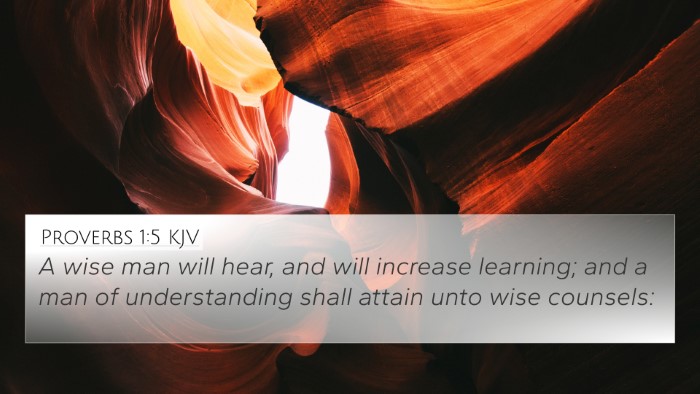Understanding Proverbs 10:8
Proverbs 10:8: "The wise in heart accept commands, but a chattering fool comes to ruin."
Summary of Meaning
This verse contrasts the behavior of the wise and the foolish. The wise person is receptive to instruction and guidance, showing a heart that is open to learning. In contrast, the fool is characterized by reckless speech, leading to self-destruction. This depiction underscores the importance of wisdom in navigating life’s challenges.
Insights from Public Domain Commentaries
- Matthew Henry: Henry emphasizes the virtue of accepting correction as a mark of true wisdom. He points out that a wise person eagerly accepts commands and instruction, which is a foundation for living wisely. In contrast, the "chattering fool" represents individuals who speak without thought and are prone to destruction due to their folly.
- Albert Barnes: Barnes highlights that the wise will readily accept direction and embrace discipline. He warns against the dangers of foolish speech, suggesting that idle talk can lead to misunderstandings and ultimately to downfall. He asserts the need for those who seek wisdom to listen more and speak less.
- Adam Clarke: Clarke focuses on the heart's role in receiving divine instruction. He notes that those with wise hearts are humble and willing to learn. The fool, being arrogant and full of empty words, focuses on self-promotion and disregards sound advice, leading to their ruin.
Cross-References with Proverbs 10:8
To gain a deeper understanding of Proverbs 10:8, we can explore its connections with other Bible verses:
- Proverbs 1:5: “Let the wise listen and add to their learning, and let the discerning get guidance.” – This verse reinforces the theme of accepting wisdom and direction.
- Proverbs 12:15: “The way of fools seems right to them, but the wise listen to advice.” – Similar to Proverbs 10:8, this verse emphasizes the folly of not listening and the wisdom contained in accepting counsel.
- Proverbs 15:31: “Whoever heeds life-giving correction will be at home among the wise.” – This verse links the concept of correction to wisdom, suggesting that receiving advice is essential for living wisely.
- James 1:19: “My dear brothers and sisters, take note of this: Everyone should be quick to listen, slow to speak and slow to become angry.” – This New Testament verse echoes the idea of being wise by listening more than speaking.
- Proverbs 18:2: “Fools find no pleasure in understanding but delight in airing their own opinions.” – This supports the notion that the fool is more concerned with their own voice than with wisdom.
- Proverbs 10:14: “Wise people store up knowledge, but the mouth of a fool invites ruin.” – Presenting a direct comparison between wise individuals who accumulate knowledge and fools whose words lead to disaster.
- Proverbs 19:20: “Listen to advice and accept discipline, and at the end, you will be counted among the wise.” – Mirrors the call to accept counsel as a pathway to wisdom.
- Ecclesiastes 7:5: “It is better to heed the rebuke of a wise person than to listen to the song of fools.” – Highlights the value of wise corrections over foolish distractions.
- Proverbs 20:3: “It is to one’s honor to avoid strife, but every fool is quick to quarrel.” – Discusses the foolish nature of those who speak too readily and become embroiled in unnecessary conflict.
- Proverbs 21:20: “The wise store up choice food and olive oil, but fools gulp theirs down.” – A reflection on the prudent use of resources and the foolishness of recklessness.
Significance of Cross-Referencing
Cross-referencing Biblical texts enriches our understanding of the Scriptures and demonstrates the interconnectedness of divine wisdom throughout the Bible.
Considering tools for Bible cross-referencing, believers can utilize resources such as Bible concordances, Bible cross-reference guides, and Bible reference resources to explore themes. Understanding how to employ cross-references effectively enhances one’s study, providing profound insights into Biblical teachings.
The Bible cross-reference system also aids in identifying connections between the Old and New Testaments. For example, exploring the book of Proverbs in light of the teachings of Jesus demonstrates consistency in God's message about wisdom and foolishness.
Practical Application
For personal growth, readers can ask themselves: What verses are related to my current struggles? Engaging in cross-referencing Bible study methods can provide clarity and encouragement from Scripture that supports the idea of wise living.
By reflecting on the similarities between Proverbs 10:8 and other biblical teachings, individuals can gain a more holistic view of the importance of wise speech and receptiveness to guidance.
A Call to Wisdom
In conclusion, Proverbs 10:8 serves as a powerful reminder of the significance of wisdom and the dangers associated with a fool's careless words. Embracing instruction leads to growth, while reckless speech can lead to one's downfall. In applying these lessons, we are encouraged to nurture a wise heart that seeks to learn and understand better.















